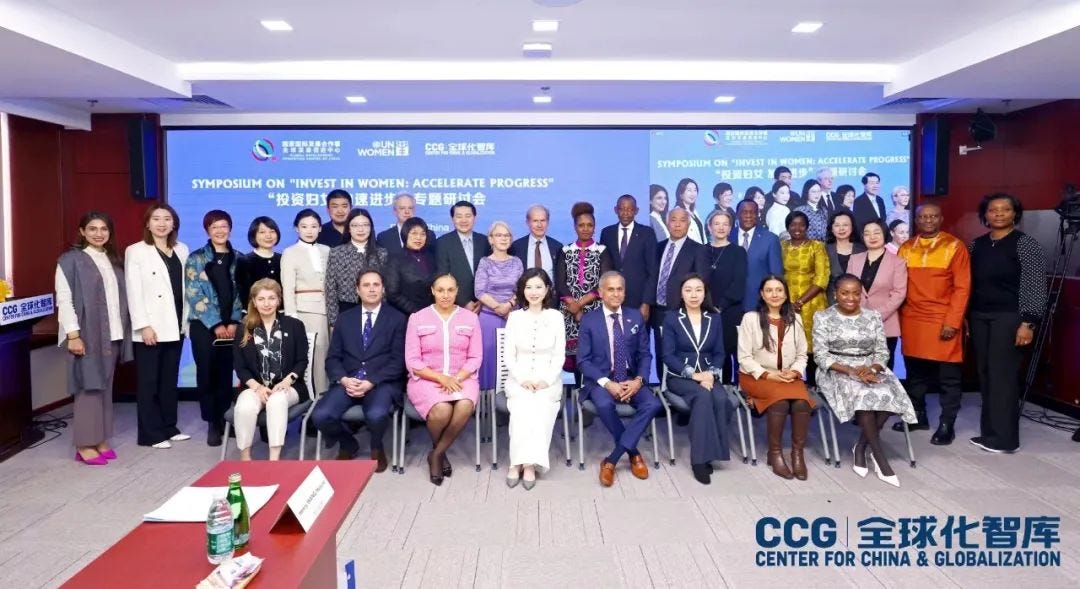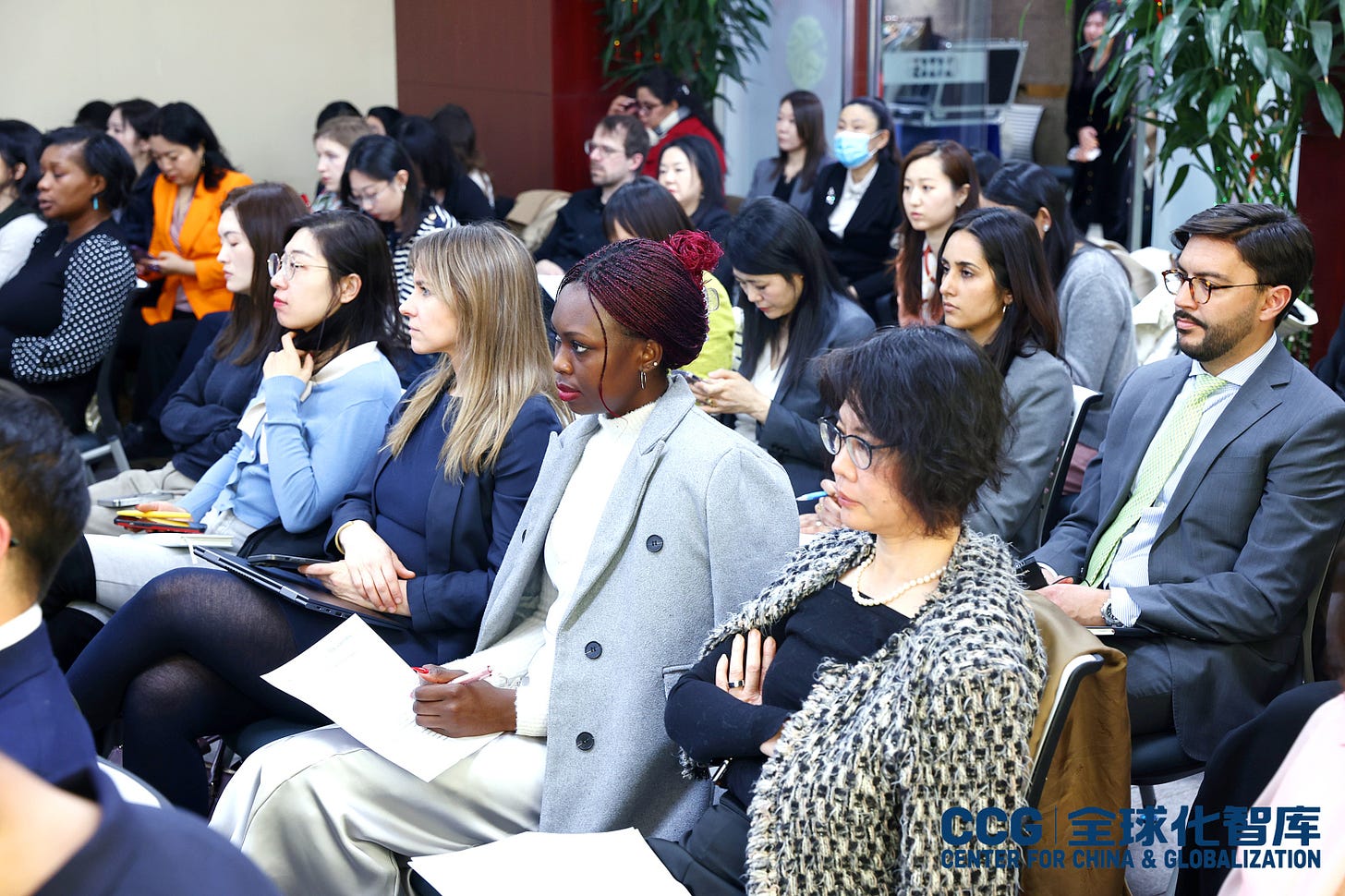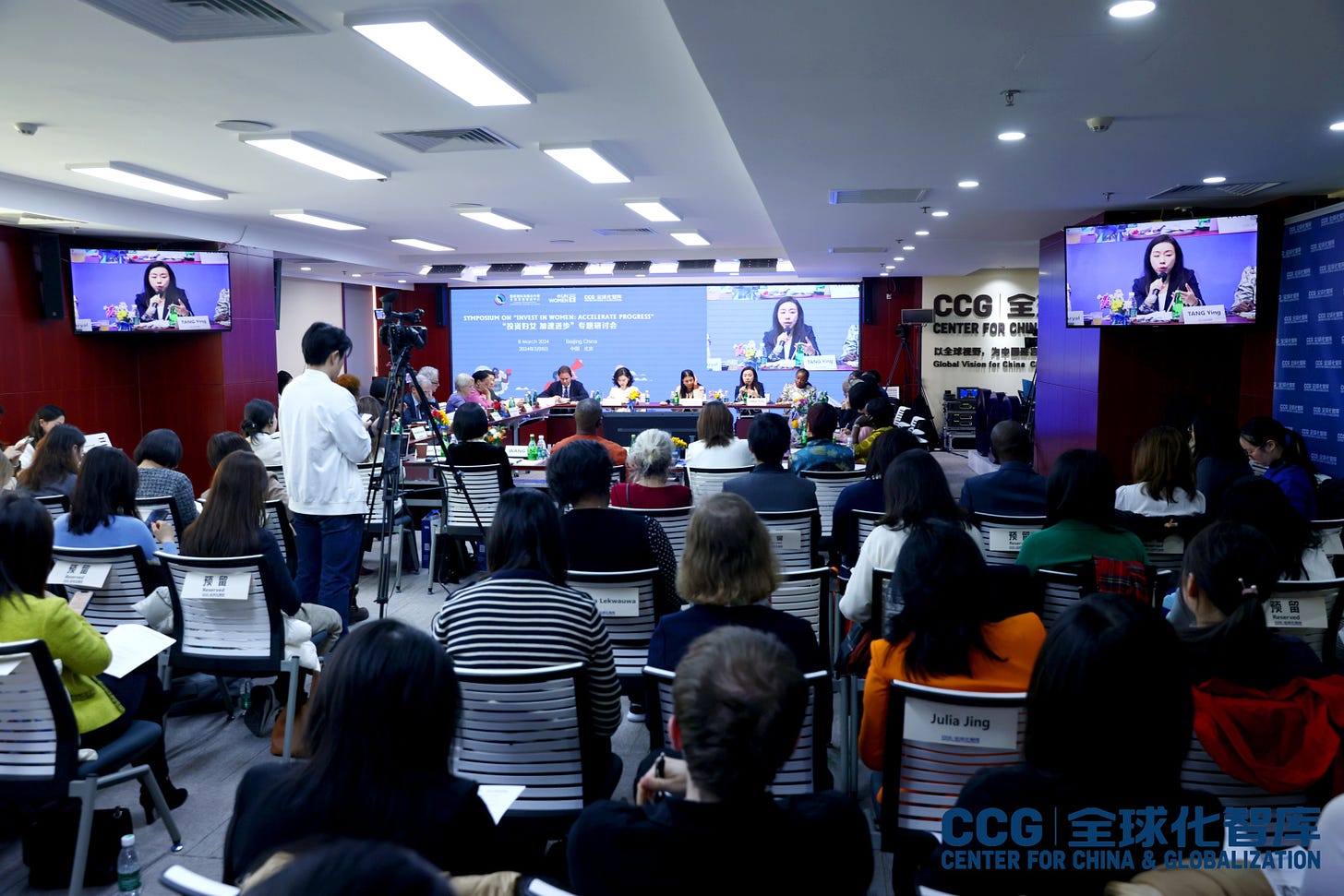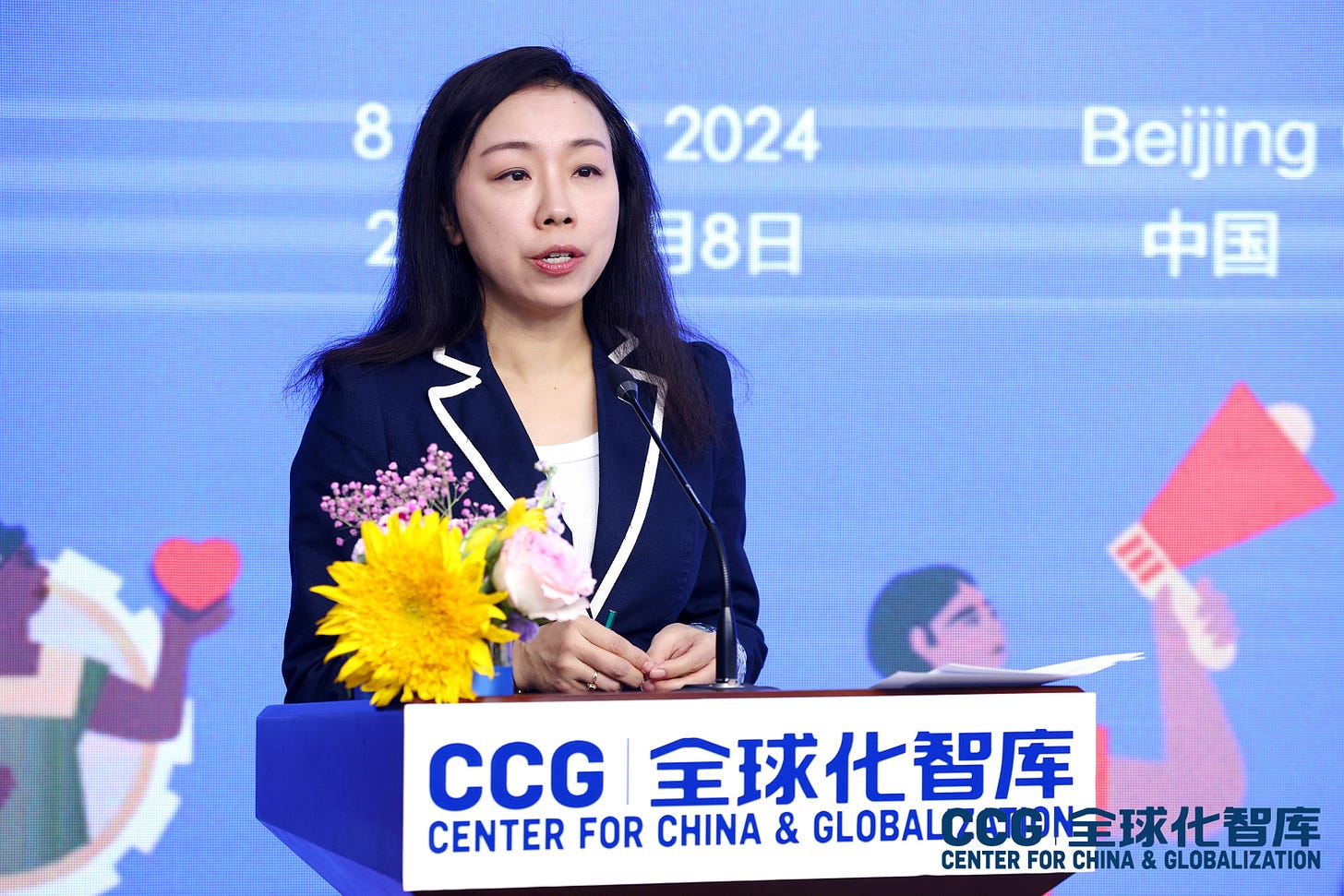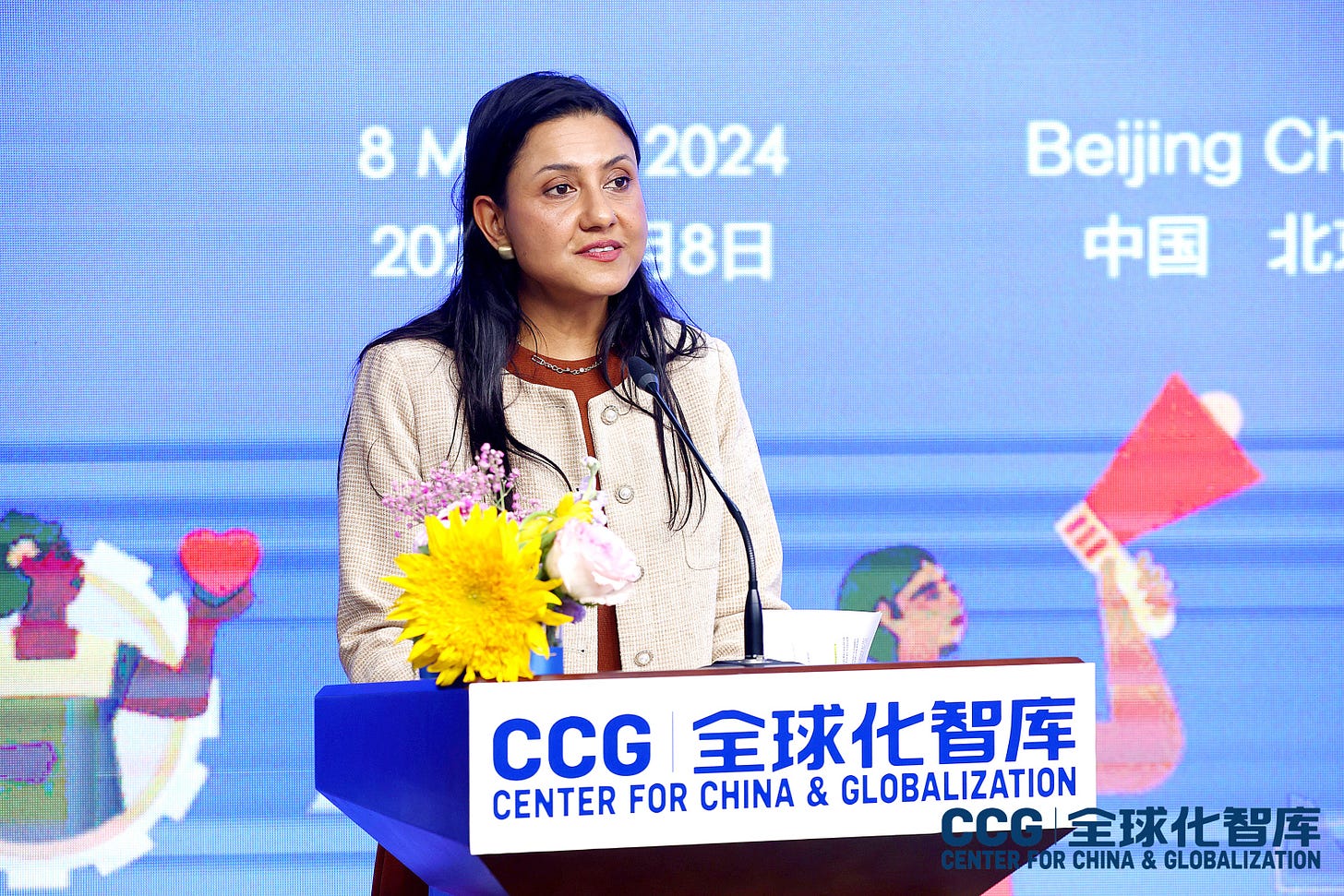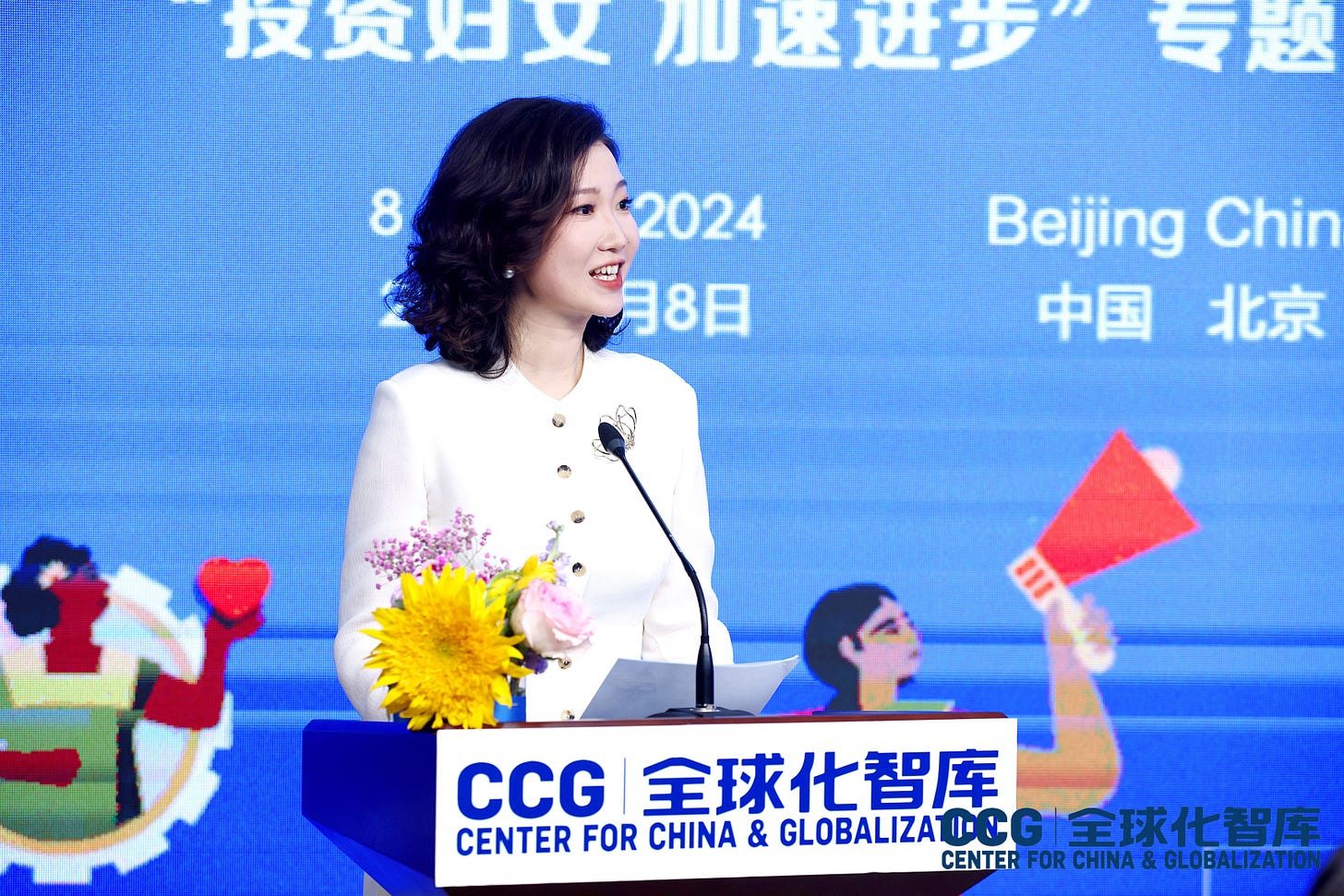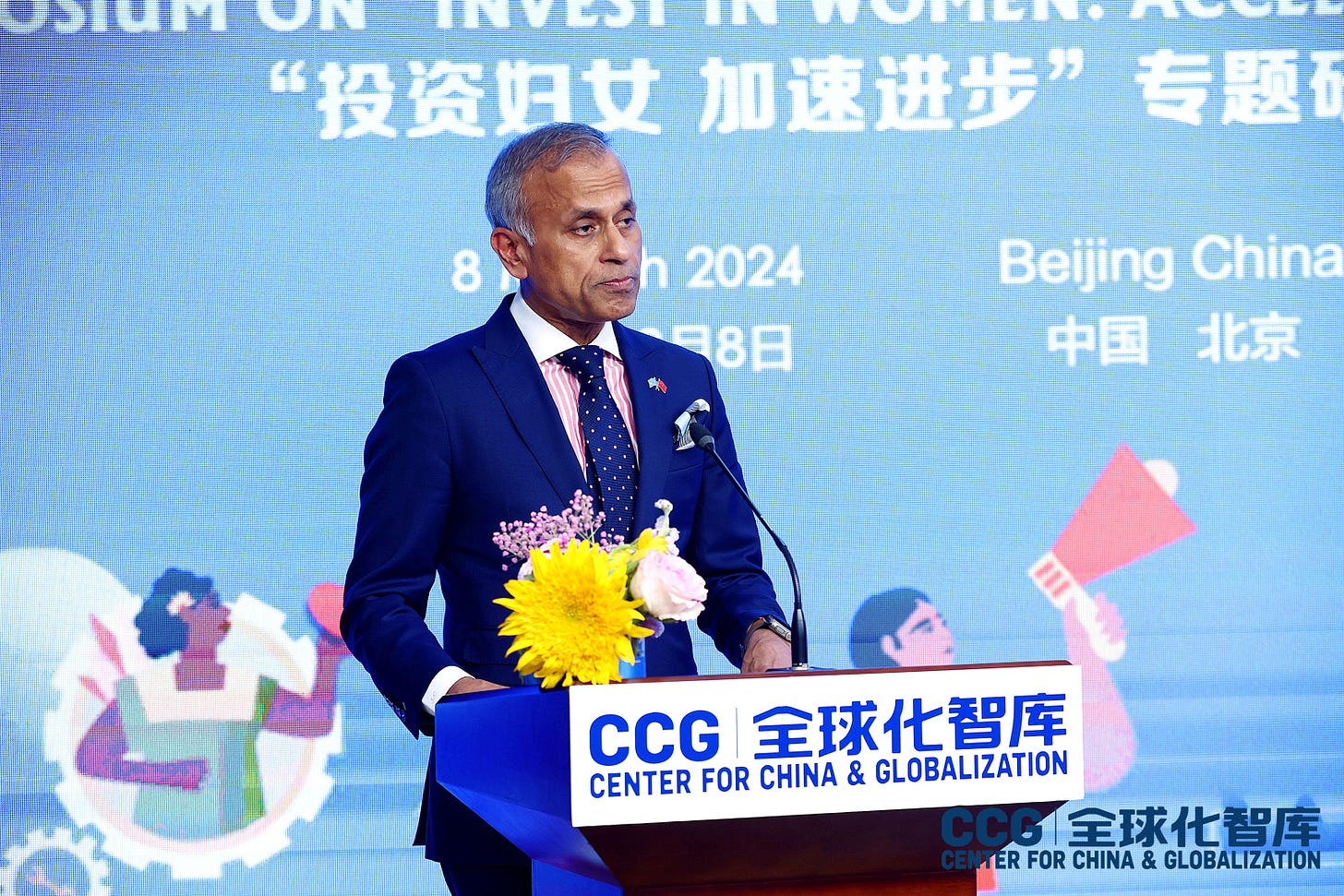Gender-responsive investments & policies are essential for empowerment of women
Symposium addressing women's poverty was held on International Women's Day by CCG, UN Women, China International Development Cooperation Agency.
On March 8, 2024, celebrating International Women's Day with the goal of the achievement of SDG 5: Achieve gender equality and empower all women and girls by 2030, a symposium titled "Investing in Women: Accelerating Progress" was organized at the headquarters of Center for China & Globalization (CCG) in Beijing. This event was a joint effort by the CCG, the Global Development Promotion Center (GDPC) of the China International Development Cooperation Agency (CIDCA), and the UN Women China Office.
The symposium successfully convened nearly a hundred representatives from various sectors both within China and internationally, including government bodies, diplomatic entities in China, UN organizations, financial institutions, the private sector, academia, and civil society organizations.
The event was reported by domestic Chinese news outlets including Guangming Daily Online, CGTN, Chinese Social Sciences Net. The Chinese and English video recordings of the event were broadcast and remain available on the Chinese internet.
Today, CCG Update will publish the opening speeches and keynote remarks delivered by:
Tang Ying, Director General, Global Development Promotion Center, China International Development Cooperation Agency
Smriti Aryal, Country Representative, UN Women in China
Mabel Lu Miao, Co-founder and Secretary-General of the Center for China & Globalization
Siddharth Chatterjee, Resident Coordinator, United Nations China
The remaining parts of the event will be published later.
Tang Ying, Director General, Global Development Promotion Center, China International Development Cooperation Agency
Your Excellencies,
Distinguished guest,
Dear friends,
Actually, I should say dear brothers and sisters because today I don't see it so formal.
Actually, it's one of the most joyful symposiums I have ever experienced, because it's our big day today and it's really a happy gathering. So on this special occasion, and on behalf of the Global Development Promotion (GDP) Center, I would like to express my great pleasure to co-host today's symposium in partnership with UN Women in China and the Center for China & Globalization. Attaching great importance to this event, my big boss, the chairman of China International Development Cooperation Agency (CIDCA), Mr. 罗照辉 Luo Zhaohui, especially designates me to say hello to all of you and especially wish happiness to our sisters and to extend congratulations on the convening of the symposium, as he is now in the Two Sessions.
Women are creators of civilization and represent an important force driving social development and progress. From the publication of the Declaration of the Rights of Woman over 200 years ago to the establishment of International Women's Day 114 years ago, from the establishment of the Commission on the Status of Women to the adoption of the Convention on the Elimination of All Forms of Discrimination against Women, I should say every step ever taken is a giant step forward for human beings' pursuit of gender equality.
China has always valued gender quality and the development of women's cause. I just got the information that the first law launched since the founding of the People's Republic of China is the Marriage Law, which guaranteed the equal rights of men and women and greatly improved the status of women of China. President Xi Jinping extends festive greetings to women on each International Women's Day. The Chinese government insists on incorporating the promotion of women's development into the overall plan of China's national, economic, and social development and provides a strong political and institutional guarantee, including the NPC's legislation. Achieving gender equality and empowering all women and girls as the Sustainable Development Goal 5 (SDG 5) is an important concern of the Global Development Initiative (GDI) put forward by President Xi Jinping.
The women's development is closely related to the GDI's eight priority cooperative areas like poverty reduction, food security, financing for development and digital economy, etc. As the specialized institution of China to implement the GDI, our center highly values joint efforts in supporting global women's development towards a community with a shared future. Globally, about 600 million women still live in the suffering of wars, conflicts, and poverty and are exposed to diverse crises and risks, including resource shortage, food insecurity, and gender violence.
UN statistics reported an annual deficit of 360 billion U.S. dollars in implementing measures for the promotion of gender equality by 2030, indicating an appalling shortage of funds and resources. I guess that's why we're here today. It's our aspiration that today's symposium will be a platform to promote communication among relevant government departments, UN agencies in China, financial institutions, private sectors, and think tanks. We call on all parties to increase our efforts in financing for gender equality, explore new cooperation modalities, and pursue more efficient participation. Personally, as a delegate of the 13th National Women's Congress – Madam Miao and l were on the same floor at the Congress – I'm obliged personally to contribute my part to the global women's development. Finally, I wish the success of our symposium and wish our sisters a very happy holiday.
Smriti Aryal, Country Representative, UN Women in China
Excellencies,
Sid, UN Resident Coordinator,
Dear DG Tang Ying,
Dear Mabel Miao,
Distinguish guests here who are joining in person and those joining online,
My dear UN colleagues,
Good afternoon! On behalf of UN Women, I would like to join the Global Development Promotion Center of CIDCA and the Center for China & Globalization, CCG, to extend our warmest welcome to you.
Today is International Women's Day – IWD, I will call it in short from now on - a day to celebrate women's rights, their success, their leadership, and their contribution to this world. And I salute and celebrate all women in and outside of this room today.
This year's IWD theme, "Invest in Women: Accelerate Progress", is aligned with the priority theme of the 68th Commission on the Status of Women – CSW in short form – on accelerating the achievement of gender equality and women's empowerment by addressing poverty and strengthening institutions and financing with a gender perspective.
Please allow me to begin by outlining why this theme is so important. With only six years away from the achievement of SDGs, our SDG 5 is faltering. At the current rate of progress, all targets under SDG 5 are not looking possible to be met by 2030. The world's poorest are women. Globally, one in 10 women - that is 10.3% of women - live in extreme poverty. In fragile and conflict contexts, women are 7.7 times more likely than men to live in extreme poverty, face heightened food insecurity, and increased risk of sexual and gender-based violence. Under-investment in health and education, social protection, and discrimination in the workplace, financial, and social services continue to intensify women's poverty. If the current trend continues, over 340 million women and girls will be living in extreme poverty by 2030. Alarmingly, the impact of climate change could push an additional 158.3 million women into poverty - that is 16 million more than men and boys. So to achieve SDG 1 on ending poverty by 2030, progress must be 26 times faster.
Second issue, only 26% of 150 countries which were surveyed last year have a comprehensive system to track and make public allocations to gender equality. Without robust systems and governance, countries cannot cost, allocate, or spend resources to implement national gender equality laws and policies or to ensure public financing is grounded in the realities of the inequities that exist.
The financial requirements, as also outlined by DG Tang, are huge, with USD 360 billion annually. That is a shortfall. Just in three areas of SDGs – ending poverty, ending hunger, and promoting participation of women – that is the amount that we lack. And this amount is, of course, even bigger if we were to look at gender targets across all other SDGs. Based on 2020 and 2021 data, just over 4% of bilateral official development assistance (ODA) went to programs where gender equality and women's empowerment are the primary objectives. Globally, a staggering 1.7 trillion financing gap persists for women-led micro-, small and medium-sized enterprises to sustain their businesses. Women only hold 15% of executive roles, highlighting the entrenched male dominance within the financial industry itself. It is possible, however, to make policy choices aimed at accelerating progress towards ending poverty and achieving sustainable and inclusive development for all. This will require investment and a comprehensive set of policies, economic and social policies, and gender-responsive accountable institutions to address systemic structural barriers and intersecting forms of discrimination that women and girls continue to face.
To this end, as UN Women, we're calling for the following four actions.
First, strengthen financing and institutions to address women's and girls' poverty. This includes institutionalization of gender-responsive budgeting to target public spending, debt relief to free up public financing, and progressive taxation for expanding public investment needed to eradicate women's poverty.
Second, accelerate proven solutions towards gendered poverty reduction. This includes high-quality public services, strengthening social protection mechanisms and systems, recognizing care as a global public good, and investing in the care economy to reduce women's and girls' poverty. A critical enabler, of course, for all of this is to have a robust gender data ecosystem to truly understand the multi-dimensional nature of poverty and to be able to inform evidence-based policy in programming actions.
Third, invest in women's leadership to drive gender-responsive work for appropriate policies, development strategies, and meeting the diverse needs of women and girls. A critical aspect of this includes supporting women's leadership and participation in the economy and across all sectors at all levels, increasing financial support towards women's rights organizations, women-led cooperatives, and social service organizations who are at the frontline of delivering services for women and girls, including as first responders in crisis and conflict.
Fourth, expand fiscal space and drive resources for financing through private sector partnerships and sustainable finance markets. In the era of digital and green transitions, it is crucial to ensure green and climate financing, digital financing, and fintech are accessible and equitable for every woman, every girl. There is a need for us to renew commitments and embrace innovative approaches for the financial inclusion of women and girls through market-based solutions and strengthen accountability to deliver for women and girls.
As UN Women, we have been partnering with China on many of these dimensions in China and globally. One example is our partnership with the International Fund for Agricultural Development (IFAD) and the provincial Department of Agriculture and Rural Affairs and Women's Federation in Hunan Province where we have reached almost 70,000 people and over 5,000 female-headed households across 10 pilot counties to develop capacities and access to resources for climate-smart livelihood and entrepreneurship development, securing nearly one-million-dollar grants to support 43 business startups led by women farmers. And this is a result just in 2023. There are, of course, many more examples to share from across the board.
Since the reform and opening up in 1978, China has witnessed a remarkable economic transformation, lifting nearly 770 million people – 50% of whom are women and girls – out of extreme poverty. While there is no one-size-fits-all growth and development model, we believe China's experience provides a valuable lesson for other countries in accelerating progress towards ending property, including among women and girls.
More importantly, with China being a longstanding South-South cooperation partner and finance provider, we see enormous opportunities to strengthen cooperation and innovative partnerships in accelerating gender equality and women's empowerment through these existing mechanisms. As UN Women, alongside our UN family, we stand ready to work with China's cooperation institutions and partners to inform development cooperation for enhanced SDG impact, including for SDG 5.
Excellencies,
Distinguished Guest,
I feel so honored that we have a lineup of such outstanding, esteemed speakers here today, and I sincerely am thankful to them for their time and commitment to sharing good practices, lessons learned, and reflections on how to make progress on SDG 5 through a very strong national institution, public financing, robust international cooperation policies, and through innovative public-private partnership. Please stay in tune as we hear more examples from these representatives in a bit. Through multi-stakeholder dialogue and partnerships like this one, we can begin to harness synergies and collective action to uphold multilateralism and strengthen international cooperation.
Thank you once again for joining us today for this very important discussion, and to GDPC and CCG for the collaboration and partnership to make this happen. I want to close by wishing everyone a great International Women's Day. Let's today and every day be about to stand with women for their interests, for their needs, and for their rights.
Thank you.
Mabel Lu Miao, Co-founder and Secretary-General of the Center for China & Globalization
Dear Mr. Siddharth Chatterjee,
Dear Smriti,
Dear Ms. Tang Ying,
Your Excellencies,
Distinguish guests,
Ladies and gentlemen,
Good afternoon!
Today, on International Women's Day, we celebrate a momentous occasion. We send blessings to women and girls everywhere and extend our heartfelt wishes to all those advocating for gender equality. As a top global think tank and the only international think tank in China with the special consultative status of the United Nations, CCG has been dedicated to the study of globalization, global governance, and China's role in it. We have spearheaded numerous policies and initiatives aimed at bridging domestic and international communities as well as the private and public sectors. Gender equality and policies benefiting women and children have long been the focus of our CCG's endeavors. Personally, I'm also a delegate of the National Women's Congress – the same status as Ms. Tang Ying.
Over the past two years, CCG, in collaboration with the UN Women China Office, has organized symposiums on the exact same day – on International Women's Day – on two SDG topics. One is about digitalization and innovation; the other is about biodiversity and climate change. CCG and the UN Women China Office also co-hosted the Global Talent Sustainable Development Forum at the China International Fair for Trade and Services (CIFTIS) as well as the Global Talent Mobility and Development Forum at the China International Import Expo (CIIE).
In the past two years, on International Women's Day, at the same symposiums, we have had the honor of inviting distinguished leaders from Chinese ministries of Ecology and Environment, Education, Foreign Affairs, Industry and Information Technology, and Science and Technology, as well as the ambassadors to China, representatives from international organizations, multinationals, and Chinese private enterprises, and well-known scholars and experts from various fields.
Today, we're very privileged to convene the "Invest in Women: Accelerating Progress" symposium on financing for a gender-equal future. Our goal is to unite a diverse era of stakeholders from China, including esteemed government officials such as the DG-level leaders from the National Development Reform Commission (NDRC), the Ministry of Finance, and the China Women's Development Foundation. We extend our sincere appreciation to them for sparing time from their very busy schedules to join us today. Additionally, we warmly welcome financial experts, representatives from UN agencies, and leaders from the private sector and civil society. Our discussion will touch upon crucial things, including financing for gender equality, international development cooperation, public policy, and public-private partnerships.
Ladies and gentlemen,
Your Excellencies,
At this juncture, the call to finance gender equality resonates as a pressing imperative for all committed to fostering a just and equitable society. In light of challenges and opportunities, investing in initiatives and promoting gender equality are not just a moral obligation, but a fundamental requirement for our universal prosperity and sustainable development.
As we gather here today, we convey not merely to elaborate on the crucial aspect of financing gender equality, but also to capitalize on collaboration and innovation. We eagerly anticipate engaging in vibrant dialogues, sharing insights, and exchanging best practices. Promoting gender equality and women's empowerment is crucial to achieving SDG 5 and also the priority focus of the Global Development Initiative initiated by China, especially in the lead-up to 2025 which marks the 13th anniversary of the Fourth World Conference on Women and the adoption of the Beijing Declaration and Platform for Action.
Finally, I would like to express our gratitude to our long-term partner – the UN Women China Office. Thank you, Smriti - and the Global Development Promotion Center of China International Development Cooperation Agency - Thank you, Ms. Tang Ying - And our distinguished sponsor, the "Sweet Ambassador to the World" Amos Sweets, for providing candies as gifts for everybody. We extend our thanks to Ms. He for your generous arranging for the beautiful coffee break from GIADA, which is a well-known Italian female luxury brand. We appreciate the hard work of the team of UN Women in China, the Global Development Promotion Center and the CCG team very much.
Last but not least, I would like to say "Happy International Women's Day" to everybody, for girls, for women, for everybody. Thank you.
Siddharth Chatterjee, Resident Coordinator, United Nations China
Ms. Tang Ying, Director General, Global Development Promotion Center, China International Development Cooperation Agency,
Dr. Mabel Lu Miao, Co-founder and Secretary-General of the Center for China and Globalization,
Ms. Smriti Aryal, UN Women's Country Representative in China,
Colleagues from the UN family,
Excellencies,
Yesterday at the Great Hall of the People, there was a beautiful gathering to mark International Women’s Day. It was a festive atmosphere and a wonderful opportunity to witness outstanding women convened from various walks of life. I would like to commend Ms. Shen, the President of the All-China Women’s Federation, for her leadership and commitment to advancing Sustainable Development Goal 5, which, on all counts, will be the anchor for the success of all of the SDGs.
With nearly 64 per cent of women in China in the labour force, they have been the cornerstone of China’s meteoric socioeconomic progress. The global average of women in the labour force is at 39 per cent and many countries can learn from China’s incredible growth trajectory.
The clarion call by Chairman Mao that women hold up half the sky enabled the emancipation of women, and can be an experience many countries can learn from.
The global theme for this year's International Women’s Day, “Invest in Women: Accelerate Progress”, speaks to the core principles of gender equality and women's empowerment (GEWE).
It emphasizes the urgent need to strengthen financing and institutions to address women and girls’ poverty, invest in female-led organizations, and advocate for gender-disaggregated data to eradicate gendered poverty through new development strategies.
Gender equality is not only a fundamental human right but a necessary foundation for a peaceful, prosperous, and sustainable world. It is non-negotiable. The equal rights and treatment of all genders are crucial to deliver on the promise of the 17 SDGs.
Globally, 1 in 10 women today live in extreme poverty. Poverty disproportionately affects women and girls due to intersecting discrimination and systemic failures, emphasizing the urgent need for accelerated action to end poverty (SDG 1) and achieve gender equality (SDG 5) by 2030.
To achieve these goals, we must expand the fiscal space through inclusive and redistributive economic policies, well-targeted public and private investments, debt sustainability frameworks that integrate climate vulnerabilities, and increased official development assistance for gender equality and women’s empowerment.
Furthermore, we must strengthen public institutions’ accountability, while removing barriers to direct gains and adopting intersectional perspectives in decision-making to advance gender equality.
This entails providing robust, flexible financing for women’s organizations and improved coordination across different departments and tiers of government.
Investment in public services to strengthen gender-responsive social protection systems can serve as a beacon of progress in inclusive economic development.
Specifically, public care systems could contribute to improving education, health, and nutrition outcomes, while preventing gender-based violence, reducing the burden of unpaid care work, and facilitating women’s access to improved work conditions and sustainable livelihoods.
Enhancing multidimensional poverty data and statistics is also essential to understand the challenges faced by women living in poverty and to monitor progress effectively.
We must increase the production and use of gender-disaggregated data to hold accountability at all levels for poverty eradication.
Moreover, we must advocate for a shift towards caring and green economies that amplify women’s voices and address poverty, inequality, and environmental degradation, all of which heavily affect women and marginalized communities.
As we approach 2025, a year that will mark the 30th anniversary of the Fourth World Conference on Women and the Adoption of the Beijing Declaration and Platform of Action, and as we continue to align with China’s 14th Five-Year Plan, the vast potential arises to enhance gender financing in both China and beyond.
To seize these opportunities, we must take advantage of cross-sectoral efforts involving policymakers, financing institutions, private sectors, social organizations, academia, and development partners to work together to rejuvenate the momentum for GEWE commitments and the SDGs.
Today's symposium provides a timely opportunity to discuss key dimensions in promoting gender equality and women’s empowerment in China.
As the United Nations family in China kicks off the formulation process of a new Cooperation Framework for 2026 to 2030, mainstreaming gender equality and women’s empowerment remains our highest priority.
To achieve this integral goal, we have established a UN Gender Theme Group, which is co-chaired by UN Women and UNFPA. This theme group provides strategic and technical advice to the UN Country Team across policy advocacy, normative processes and programs to ensure rights and empowerment for women and girls. This also includes the UN’s engagements with stakeholders and other partners in China through joint development projects and South-South Cooperation.
China has long been a partner to developing countries in providing assistance and supporting South-South Cooperation.
In its 2021 White Paper highlighting international development cooperation efforts, China pointed to the SDGs and the 2030 Agenda as guiding frameworks for its contributions to partner countries, while stressing the role of multilateralism. Notably, gender equality is one of its eight key aspects.
As China continues to expand its development cooperation institutions, we see continued opportunities to draw from international best practices, norms, and standards.
Together, we can build a gender-responsive infrastructure of development cooperation policies, guidelines, and frameworks to effectively mainstream gender equality and women’s empowerment at the programmatic and institutional levels in order to achieve SDG 5 and all of the other cross-cutting goals.
The UN in China is committed to working with the Government of China, stakeholders, and partners, which includes many of you joining us here today, to support continued progress for the needs, rights, and interests of women and girls.
By enabling women and girls to tap into their potential, we are not just empowering individuals, we are catalysing progress for everyone.
In his International Women’s Day message, the UN Secretary-General Mr. António Guterres said, “We must support women’s organizations on the front line. And we must invest in programmes to end violence against women, and to drive women’s inclusion and leadership in economies, digital technologies, peacebuilding and climate action.”
So, let us invest in women to achieve substantive equality in financing mechanisms, resource mobilization, and transformative change.
Thank you very much.
The CCG Update will publish the remaining discussions on the Mar. 8 event later.






